Timeline: Lockerbie bombing
- Published
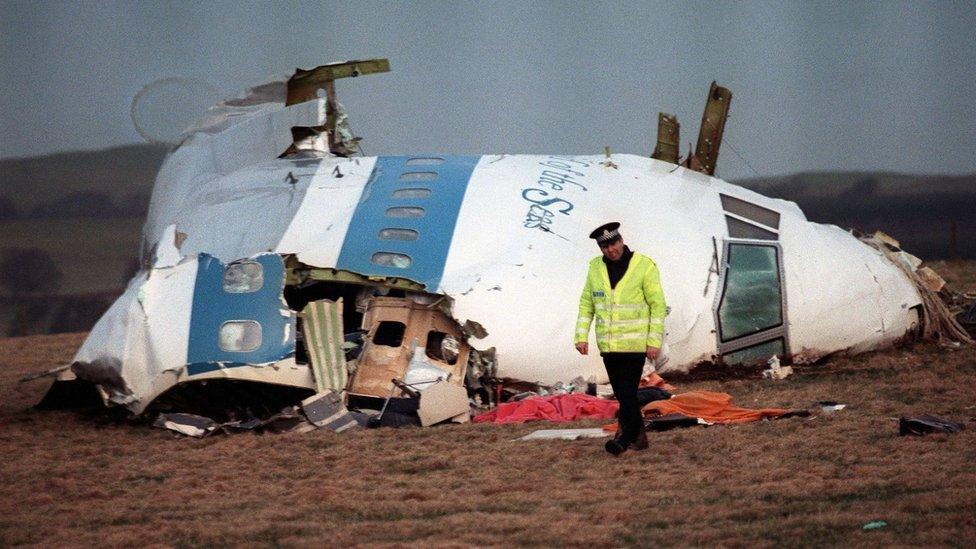
A Libyan man accused of making the bomb which destroyed Pan Am flight 103 over Lockerbie has been taken into United States custody.
The explosion on board the Boeing 747 on 21 December 1988 left 270 people dead, making it the deadliest terrorist incident to have taken place on British soil.
Another Libyan, Abdelbaset al-Megrahi, is the only man ever convicted in connection with the atrocity.
He was found guilty of the murders in 2001, but always protested his innocence. He died in 2012 after being allowed to return home when it emerged that he had terminal cancer.
Here is a timeline of the key developments in the case.
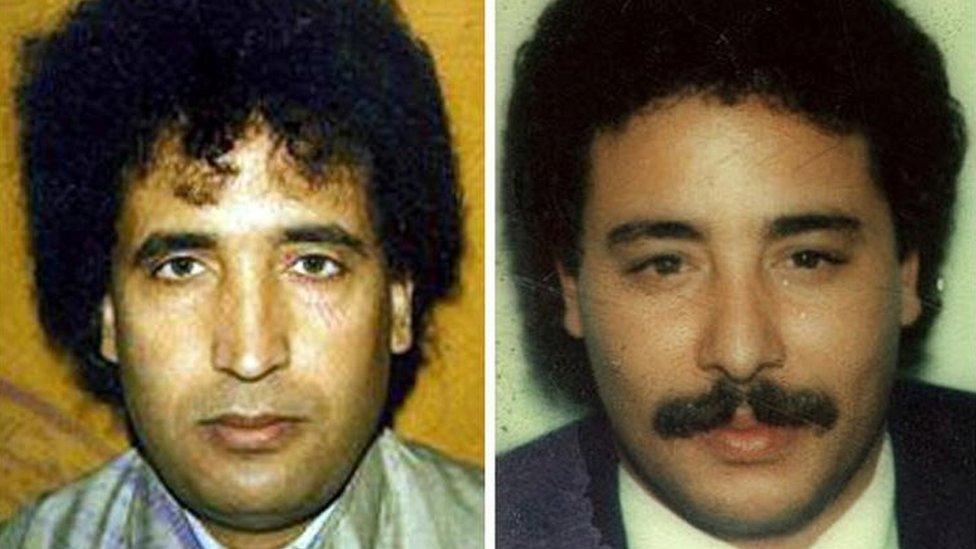
Abdelbaset Ali al-Megrahi and Al Amin Khalifa Fhimah were accused of carrying out the bombing
21 December 1988: Pan Am Flight 103 from London to New York explodes 31,000 feet over Lockerbie, 38 minutes after take-off from London.
The 259 people on board the Boeing 747 are killed, along with 11 people on the ground.
13 November 1991: US and British investigators indict Libyans Abdelbaset al-Megrahi and Al Amin Khalifa Fhimah on 270 counts of murder, conspiracy to murder and violating Britain's 1982 Aviation Security Act.
The men were accused of being Libyan intelligence agents.
15 April 1992: The UN Security Council imposes sanctions on air travel and arms sales over Libya's refusal to hand the suspects over for trial in a Scottish court.
August 1998: Britain and the United States propose trying the suspects in the Netherlands under Scottish law.
5 April 1999: The suspects are taken into Dutch custody after flying from Tripoli to an airbase near the Hague and are formally charged with the bombing. UN sanctions against Libya are suspended as agreed.
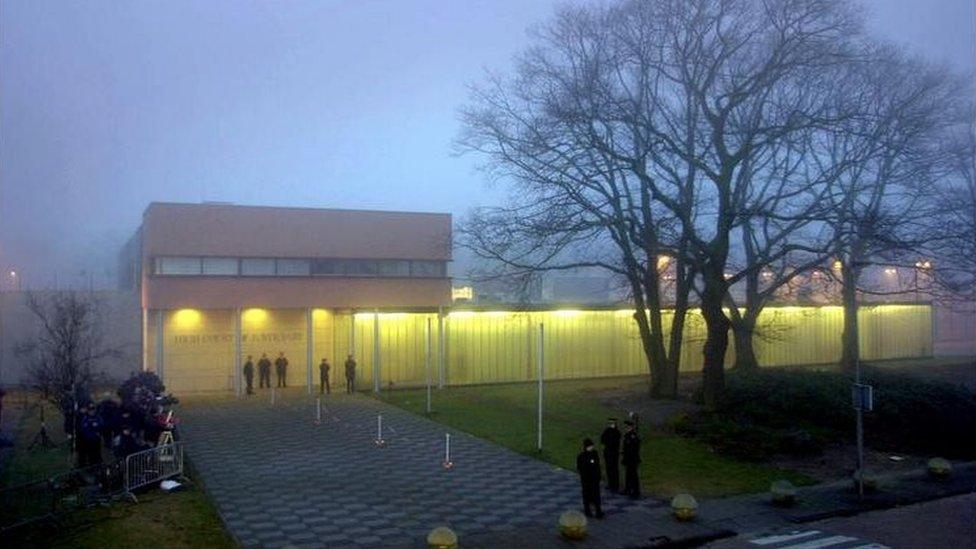
The Scottish court at Camp Zeist in the Netherlands
3 May 2000: The trial of Abdelbaset al-Megrahi, 48, and Al Amin Khalifa Fhimah, 44, opens at Camp Zeist, a specially convened Scottish court sitting in the Netherlands. Both of the accused deny murder, external.
31 January 2001: Megrahi is found guilty of murder after the historic trial under Scottish law in the Netherlands.
The judges recommend a minimum of 20 years "in view of the horrendous nature of this crime".
Megrahi's co-accused, Al Amin Khalifa Fhimah, is found not guilty and told he is free to return home.
14 March 2002: Megrahi loses his appeal, external against the conviction.
15 March 2002: Megrahi spends his first night at a prison in Glasgow, external after being flown by helicopter to HMP Barlinnie.
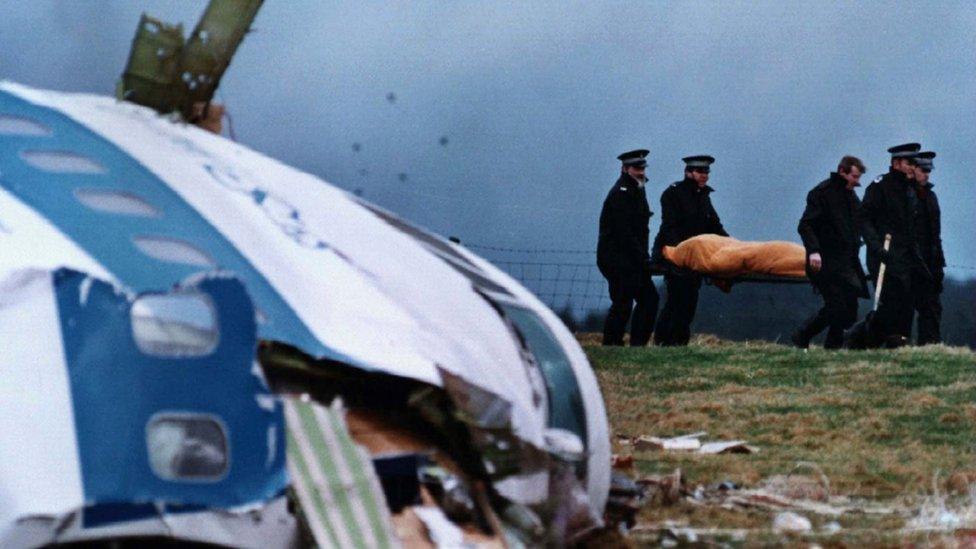
14 August 2003: Lawyers acting for families of the Lockerbie bombing victims say they have reached agreement with Libya on the payment of compensation, external.
The deal to set up a $2.7bn (£1.7bn) fund was struck with Libyan officials after negotiations in London.
24 November 2003: Megrahi is told he must serve at least 27 years in jail.
His sentence was increased after a change in the law meant he had to again come before the Scottish courts so that the punishment period could be set.
28 June 2007: The Scottish Criminal Cases Review Commission, which has been investigating the case since 2003, recommends Megrahi is granted a second appeal, external against his conviction.
21 October 2008: Megrahi's lawyer reveals the 56-year-old former Libyan intelligence agent has been diagnosed with "advanced stage" prostate cancer, external.
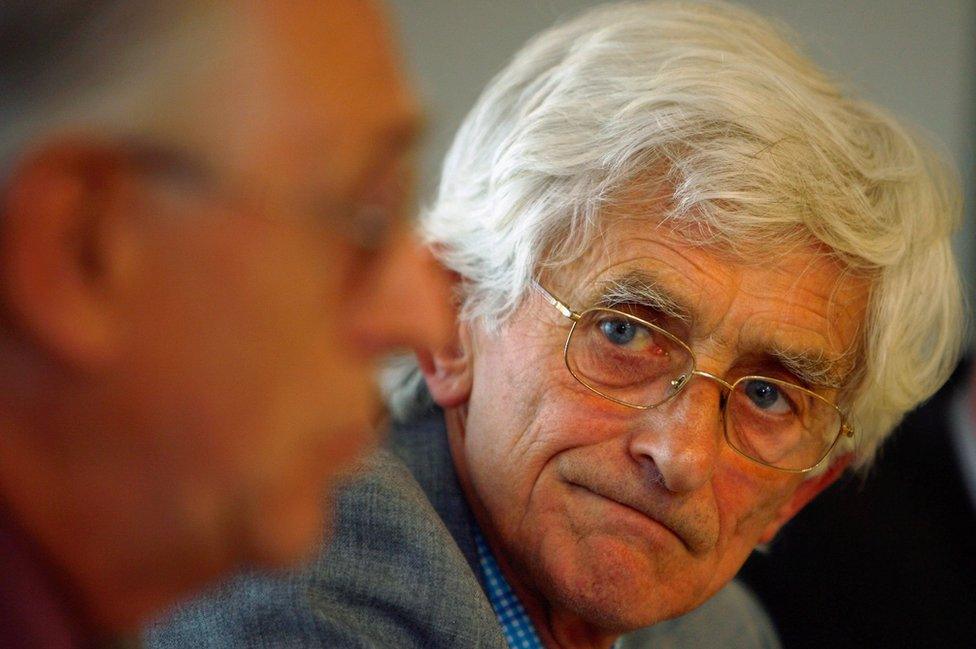
Dr Jim Swire's daughter Flora died in the bombing
31 October 2008: The father of one of the victims of the Lockerbie bombing reiterates his call for Megrahi to be released.
Jim Swire, whose daughter was killed, criticised the slow appeal process faced by the man convicted of the attack and said the question of whether Megrahi should be released was one of "common humanity", external.
14 November 2008: A court rules that Megrahi will remain in jail, external while he appeals against his conviction.
25 July 2009: Megrahi asks to be released from jail, external on compassionate grounds due to his illness.
18 August 2009: Judges accept an application by the Lockerbie bomber to drop his second appeal against conviction, external.
The permission of the High Court in Edinburgh was required before the proceedings could be formally abandoned.
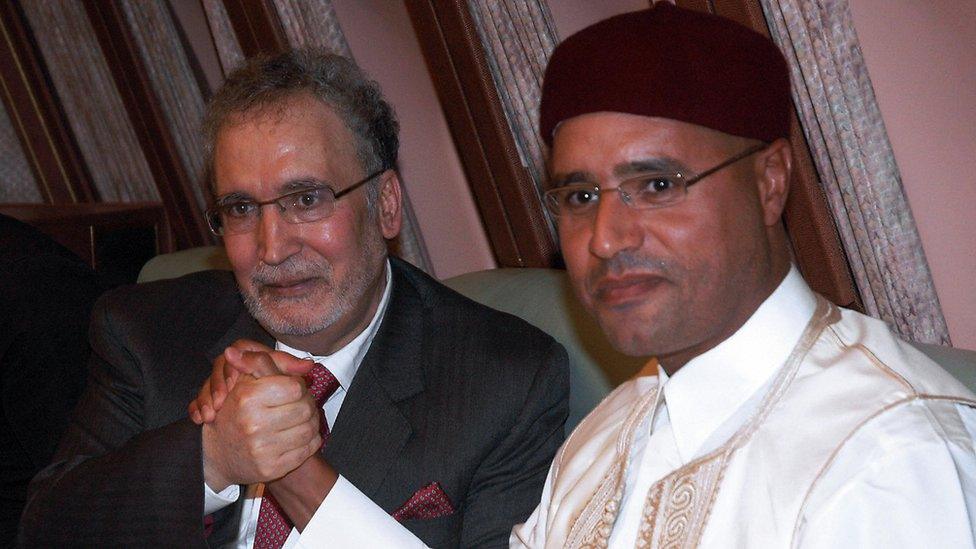
Megrahi was met on his return to Libya by Muammar Gaddafi's son Seif al-Islam
20 August 2009: The Scottish government releases Megrahi on compassionate grounds, external. He returns home to Libya aboard a jet belonging to Libyan leader Muammar Gaddafi.
24 August 2009: The Scottish Parliament is recalled to discuss the release of the Lockerbie bomber.
Justice Secretary Kenny MacAskill faces questioning from MSPs over his decision but says he stands by his decision, external and will "live with the consequences".
29 August 2011: Megrahi falls into a coma at his Tripoli home with CNN reporting he appeared to be "at death's door".
20 October 2011: Libyan leader Colonel Gaddafi is overthrown by an uprising in Libya, and is killed by rebels.
20 May 2012: Abdelbaset al-Megrahi dies at his home in Tripoli, aged 60.
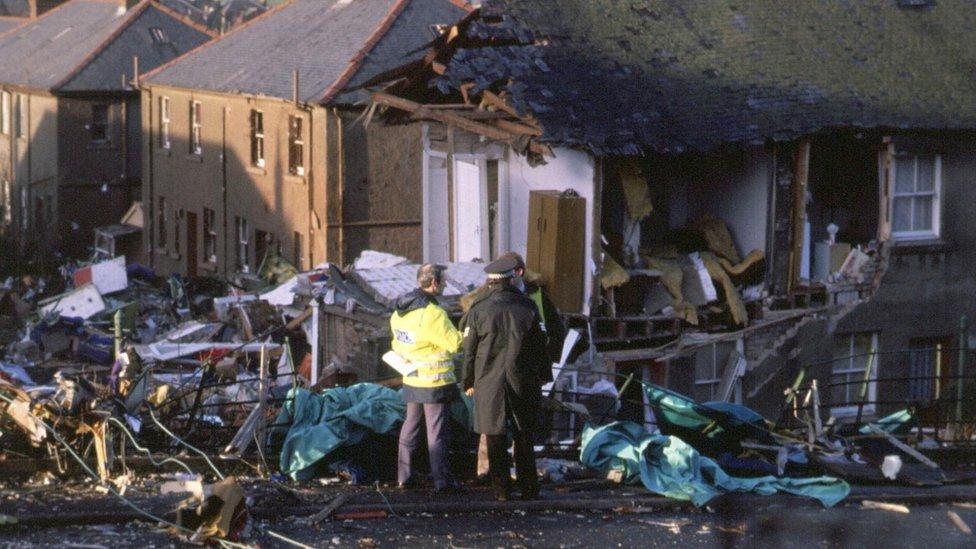
Eleven people were killed on the ground in Lockerbie
20 December 2014: Scotland's top prosecutor, Lord Advocate Frank Mulholland, reaffirms his belief that Megrahi is guilty of the Lockerbie bombing and says no Crown Office investigator or prosecutor ever raised concerns about the evidence used to convict him.
He also pledges to continue tracking down Megrahi's accomplices.
3 July 2015: Scottish judges rule that relatives of the Lockerbie bombing victims should not be allowed to pursue an appeal on Megrahi's behalf. Courts had previously ruled that only next of kin could proceed with a posthumous application.
4 July 2017: The family of Lockerbie bomber Megrahi lodges a new bid to appeal against his conviction, five years after his death.
11 March 2020: The Scottish Criminal Case Review Commissionrules that there can be a fresh appeal and refers the case to the High Court of Justiciary.
The commission says it considered six grounds of review and concluded that a miscarriage of justice may have occurred by reason of "unreasonable verdict" and "non-disclosure".
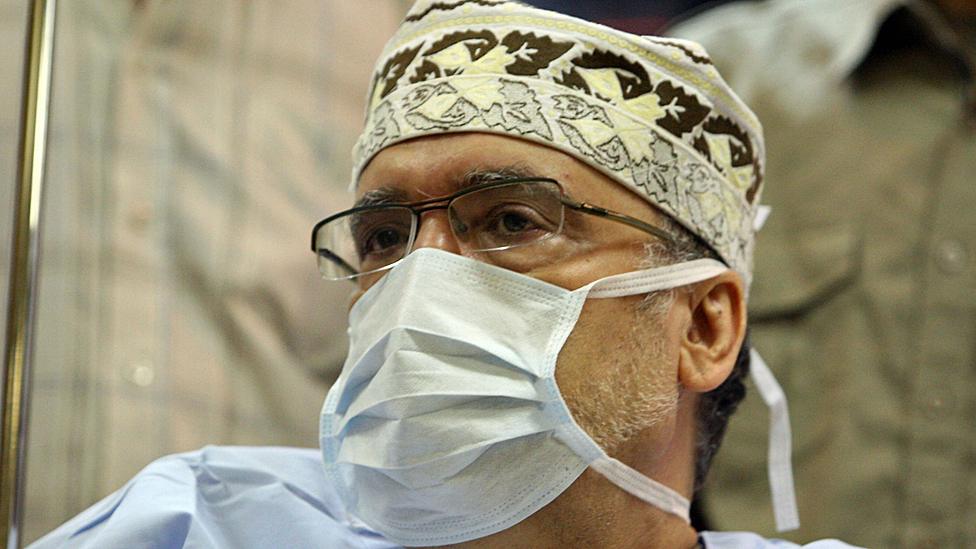
The family of Abdelbaset al-Megrahi attenpted to appeal against his conviction
22 December 2020: On the 32nd anniversary of the atrocity, the US announces it has filed charges against a Libyan suspected of making the bomb.
Attorney General William Barr says Abu Agila Mohammad Masud was accused of terrorism-related crimes.
15 January 2021: Scottish judges reject the appeal from the family of Abdelbaset al-Megrahi as the Court of Criminal Appeal upholds the verdict of the original trial.
The court rejected the argument that the original trial had come to a verdict that no reasonable court could have reached.
11 December 2022: It emerges that Abu Agila Mohammad Masud, the Libyan man accused of making the bomb which destroyed Pan Am flight 103 over Lockerbie, is in United States custody.